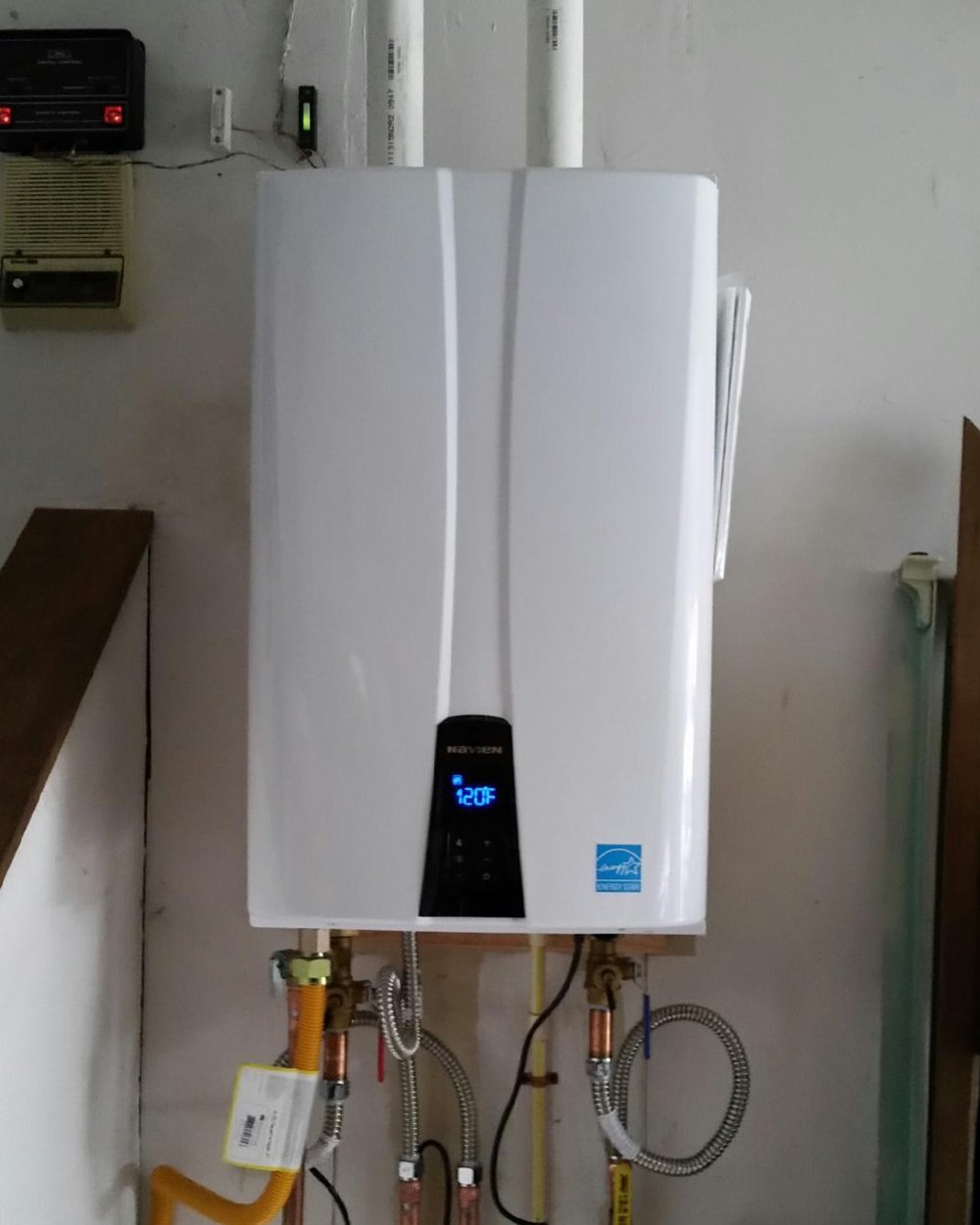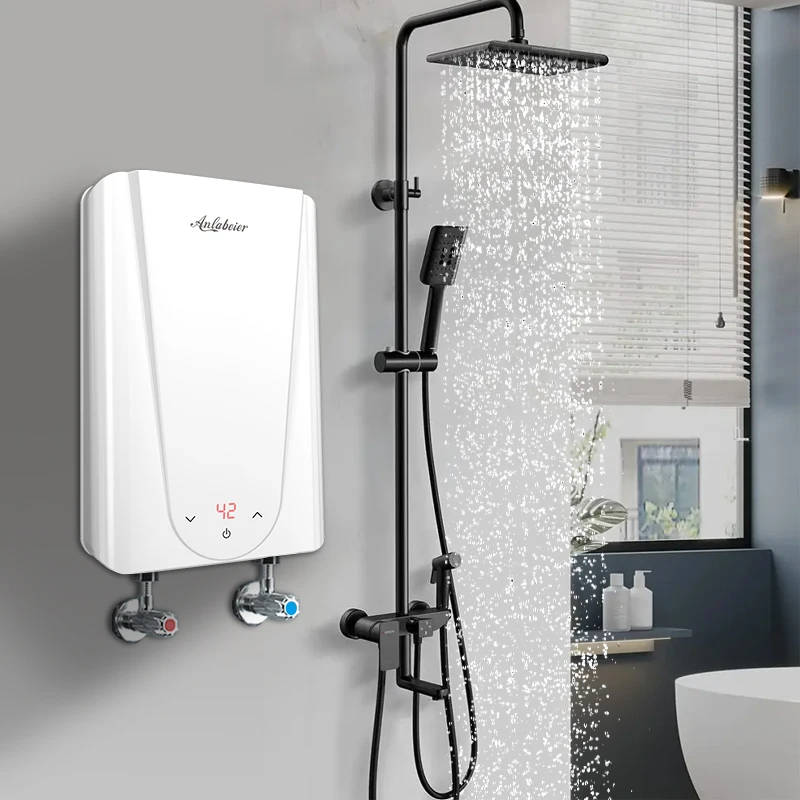A Guide To The Pros Of Smart Water Heaters
A Guide To The Pros Of Smart Water Heaters
Blog Article
The content directly below about 5 Benefits of Tankless Water Heaters is especially interesting. Read it for yourself and see what you think of it.

In a globe where comfort and effectiveness preponderate, it's not a surprise that homeowners are constantly on the lookout for smarter methods to manage their home's power intake and convenience. One technology that has gradually gained popularity is the tankless hot water heater. However just what makes these systems stand out from the conventional tank-based versions the majority of us grew up with? Let's dive in and discover the benefits of tankless water heaters, aiding you decide if it's time to make the switch in your house.
Introduction
Picture this: you enter the shower after a long day, expecting a relaxing waterfall of hot water, just to be welcomed by icy droplets since the last individual used all of it up. Sound familiar? Conventional hot water heater keep a set amount of warm water, suggesting you go to the grace of that container's supply. Tankless systems, on the other hand, warm water as needed. No more going out mid-shower, no more fumbling with timetables simply to make certain hot water is offered.
Recognizing Tankless Water Heaters
What Are Tankless Water Heaters?
Tankless hot water heater, occasionally known as on-demand or instantaneous hot water heater, give warm water only as it's needed. As opposed to storing gallons of pre-heated water, these systems kick right into action the moment you activate the tap. Water travels through a heat exchanger, heating up in real-time, meaning you get an uninterrupted flow of hot water without the demand for a big container sitting idly by.
Just how Do They Vary from Conventional Equipments?
Standard heating systems hold a reservoir of hot water, making use of power to keep that storage tank at a constant temperature level. Tankless devices get rid of the standing supply, cutting down on wasted power and the large footprint of a huge cyndrical tube. Essentially, you're updating from a "stockpile" state of mind to a "made-to-order" strategy.
Typical Kinds Of Tankless Devices
Tankless hot water heater usually are available in 2 ranges: gas and electric. Gas models tend to supply higher circulation prices, perfect for larger families, while electric models frequently serve smaller homes and are commonly easier to install. Furthermore, some systems are developed for point-of-use (serving one component) while others can deal with the whole home's hot water demands.
Key Benefits of Tankless Water Heaters
Power Efficiency and Expense Financial Savings
No more heating a giant container's worth of water and keeping it cozy throughout the day. Tankless heaters reduce standby energy losses, which can reduce utility costs. While the initial cost might be higher, the long-lasting savings often validate the financial investment.
3. Space-Saving Layout
If your home is short on storage, eliminating the cumbersome tank maximizes valuable space. Tankless systems are compact and can usually be mounted on walls, stashed in edges, or mounted in limited energy wardrobes without gobbling up the whole room.
4. Longer Life-span
A well-kept tankless hot water heater can outlast its tank-based relative. Traditional containers might last 10-15 years, while tankless designs can keep downing along for two decades or even more, making them a strong investment in time.
1. Endless Hot Water Supply
Ever had to arrange showers so every person obtains their fair share of warm water? With tankless, that ends up being a distant memory. As long as the heating unit's circulation capability isn't gone beyond, you can take back-to-back showers without developing into a popsicle.
5. Improved Water Quality
Storing water in a tank can sometimes bring about sediment buildup or a slightly "off" taste. With tankless systems, fresh water is heated up instantly, decreasing the chances of debris buildup and potentially supplying cleaner-tasting water.
Considerations Prior To Changing
Though the benefits are engaging, it's a good idea to consider a couple of elements before fully committing.
Examining Your Home's Water Usage Patterns
If your family at the same time makes use of numerous fixtures with high hot water demand, ensure the unit's circulation rate fulfills your requirements. Knowing your use patterns aids you choose the appropriate dimension and sort of tankless heater.
Maintenance and Treatment Tips
Tankless systems are fairly reduced maintenance, however they aren't set-it-and-forget-it appliances.
Normal Cleaning and Descaling
Tough water minerals can build up in the warmth exchanger, affecting efficiency. Routine descaling (frequently advised each year) keeps the device performing at peak performance.
Yearly Expert Inspections
A yearly checkup from an expert ensures small concerns are caught early. They'll evaluate the device's performance, try to find leakages, and help preserve ideal performance.
Initial Investment Costs
Tankless heaters commonly come with a higher ahead of time cost. In between the unit itself and potential installation modifications, the initial price may give you sticker label shock. Yet keep in mind to see it as a long-lasting investment.
Installment Needs
Relying on your home's facilities, you might require added electrical capability or gas line upgrades. Ensure you understand the installation requirements and seek advice from an expert to prevent shocks.
Guaranteeing Appropriate Air Flow
For gas designs, proper air flow is necessary to securely remove exhaust gases. Make sure airing vent systems are clean and correctly installed to stop any potential safety and security hazards.
Contrasting Different Brands and Designs
Not all tankless water heaters are produced equivalent.
Investigating Trusted Producers
Seek trusted brand names with a background of producing top quality units. A reputable manufacturer usually supplies better customer assistance and longer warranties.
Installment: DIY or Expert?
While some homeowners delight in dealing with tasks themselves, tankless setup could not be the very best time to burst out the tool kit.
Advantages and disadvantages of DIY Setup
A do it yourself install might conserve money, yet it comes with dangers. Wrong installation can bring about inadequacy or safety worries. If you come in handy and have experience, it may be feasible-- but proceed with caution.
Reading Reviews and User Feedback
Individual evaluations and feedback from next-door neighbors or buddies that have gone tankless can provide valuable understandings. Often, real-life experiences can be more telling than advertising and marketing sales brochures.
When to Call a Professional Plumbing Professional
For most, calling a pro makes sure every little thing's done appropriately. A professional plumbing professional comprehends regional codes, sizing needs, and airing vent specifications, decreasing the threat of incidents.
Maximizing Efficiency
You have actually invested in a tankless unit-- now maximize its effectiveness.
Ideal Temperature Settings
Most individuals establish their devices between 120-140 F. Readjusting the temperature can boost comfort and financial savings. Experiment to discover a pleasant spot that does not throw away energy.
Coupling With Low-Flow Fixtures
Wish to extend your system's abilities? Think about mounting low-flow showerheads and taps. They lower water use, permitting your tankless system to deliver a steady stream of warm water without stressing.
Environmental Effect
Tankless water heaters straighten with greener living goals.
Lowered Carbon Footprint
By utilizing much less energy and only home heating water as required, tankless systems can reduce your home's carbon footprint, minimizing your environmental effect.
Preserving Natural Resources
Much less energy consumption and less squandered warm water convert into less natural resources being used, an environmental win-win.
That Benefits Many from Tankless Heaters?
The charm of tankless heaters is that they can fit a selection of houses.
Huge Families vs. Single Residents
Big families may enjoy the limitless warm water supply, while solitary passengers appreciate the power financial savings from not heating up a whole storage tank for simply a single person's morning shower.
Homeowners with Minimal Space
If your home is short on square footage, losing the bulky container frees up space for other fundamentals-- or perhaps simply extra breathing space.
Eco-Conscious Customers
Going tankless aligns with eco-friendly worths, ensuring you're not squandering power or resources.
Future Fads in Tankless Hot Water Heater
The globe of home appliances is ever-evolving, and tankless hot water heater are no exception.
Advancements in Modern technology
R&D is continuously enhancing warmth exchangers, making devices extra efficient and durable. Future models might be even quieter, more compact, and far better matched for differing environments.
Smart Home Assimilation
Envision changing your water heater's temperature using an application or obtaining upkeep notifies on your phone. As smart home technology developments, we'll see more connectivity and comfort.
Final thought
Picking a tankless water heater is greater than just updating your home's warm water system; it's investing in lasting comfort, power effectiveness, and a greener lifestyle. By considering your house's water use, being mindful of installment requirements, and committing to regular upkeep, you can enjoy a stable stream of hot water without the luggage of a bulky container. As innovation develops, you can expect also smarter, a lot more effective tankless solutions that not just make your life less complicated but also benefit the world.
5 Benefits of Tankless Water Heaters
Save Valuable Space
Since tankless water heaters do not have a massive 40+ gallon tank of water, they are considerably smaller and can fit in more narrow spaces in your home.
If you are working with limited square footage, a tankless water heater will still provide you with the hot water you need while taking up significantly less space in your home. While the exact size of a tankless water heater varies depending on the brand, some are as small as a carry-on suitcase.
Endless Supply of Hot Water
While a traditional water heater preheats and stores your water in the tank, tankless water heaters do not rely on a reservoir system.
This means that they do not run out of hot water like traditional water heaters since they make hot water as needed. Traditional water heaters need to stop and reheat water when the tank inevitably runs out, but tankless water heaters do not have this issue.
Provide Warm Water On-Demand
As mentioned above, tankless water heaters do not preheat a certain amount of water and then store it in a massive tank to be used later. An advantage of installing a tankless water heater includes water being heated instantly whenever you turn on the faucet.
When you turn on the water, it will travel through a heat exchanger in the unit and be heated with either an electric element or a natural gas burner. Gone are the days of having to ration out your hot water to make sure that you do not run out.
Longer Life Cycle
Not only do tankless water heaters provide an endless supply of hot water for your home whenever you want it, but these units tend to have a longer lifespan than water heaters with tanks.
Tanked water heaters have an average lifespan of around 10 years, as the tank is prone to corrosion, leading to serious issues. In comparison, tankless water heaters can last for around 15 to 20 years with the proper maintenance and tune-ups.
Energy Efficient
Compared to traditional water heaters, tankless water heaters are a more energy-efficient water heating option for your home. Tank water heaters must heat and reheat the water stored in the tank throughout the day, even if you are not home.
This energy use adds up over time, leading to an increase in your energy bills and added strain on your unit. A benefit of buying a tankless water heater includes saving money since it only operates when you turn on the hot water. Since it only heats up as needed, this can decrease your energy bills and save you money in the long run.
https://callrandazzo.com/blog/5-benefits-of-tankless-water-heaters/

I came across that entry on Why You Should Consider a Tankless Water Heater when browsing the internet. Do you know about somebody else who is fascinated about Unveiling the Hot Trend: The Benefits of Tankless Water? Do not hesitate to share it. Thank-you for going through it.
Book My Estimate Report this page